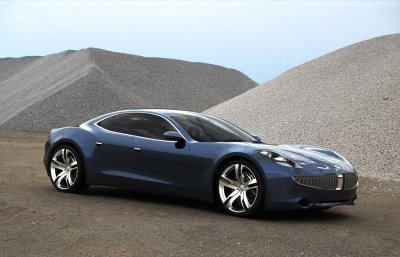I've always wished the Tesla roadster was built with pure Elise bodywork, it somehow lost most of the original's sex appeal in translation. However, I think the new plug-in hybrid by Fisker, of Aston DB9 fame, must be one of the most slinky electric vehicles yet.
'IRVINE, Calif. Oct. 31, 2007: Quantum Technologies, a publicly traded company
(QTWW) and Fisker Coachbuild, LLC disclose continuing developments of the first
production vehicle to come from Fisker Automotive, Inc. - the green American
premium car company. The four-door plug-in hybrid premium sports sedan will
make its debut at the Detroit Auto Show in January with a starting price of $80,000.
Initial deliveries will commence in the 4th quarter of 2009 with annual production
projected to reach 15,000 cars....
Performance details for the first car are impressive achieving 50 miles (80
kilometers) on a pure electric charge. Additionally, by further utilizing a gasoline or
diesel engine offered by Fisker, one can extend the total range of their Fisker to more
than 620 miles (1000 kilometers). The first Fisker will also deliver an extraordinary
100 miles per gallon - performance figures that will ultimately help to reduce the
need for the importation of foreign oil.'

The problem remains, that the Fisker still panders to the failed model of urban sprawl- it's fundamentally a conventional, private, vehicle. The stackable cars below are a brilliant means of city mobility (if only they were half as wide, twice as long to really throw out conventional spatial wisdom), in combination with mass transit. I'd love to see a dedicated, traffic-calmed series of lanes designed for real integration of these vehicles. The Aptera would fit right in, as would the Loremo.
'IRVINE, Calif. Oct. 31, 2007: Quantum Technologies, a publicly traded company
(QTWW) and Fisker Coachbuild, LLC disclose continuing developments of the first
production vehicle to come from Fisker Automotive, Inc. - the green American
premium car company. The four-door plug-in hybrid premium sports sedan will
make its debut at the Detroit Auto Show in January with a starting price of $80,000.
Initial deliveries will commence in the 4th quarter of 2009 with annual production
projected to reach 15,000 cars....
Performance details for the first car are impressive achieving 50 miles (80
kilometers) on a pure electric charge. Additionally, by further utilizing a gasoline or
diesel engine offered by Fisker, one can extend the total range of their Fisker to more
than 620 miles (1000 kilometers). The first Fisker will also deliver an extraordinary
100 miles per gallon - performance figures that will ultimately help to reduce the
need for the importation of foreign oil.'

The problem remains, that the Fisker still panders to the failed model of urban sprawl- it's fundamentally a conventional, private, vehicle. The stackable cars below are a brilliant means of city mobility (if only they were half as wide, twice as long to really throw out conventional spatial wisdom), in combination with mass transit. I'd love to see a dedicated, traffic-calmed series of lanes designed for real integration of these vehicles. The Aptera would fit right in, as would the Loremo.
Carbon-free, stackable rental cars
0 Comments Published by Cornelius on Saturday, November 03, 2007 at 6:08 PM.
Combined with a sustainable supply of energy for recharging, the stacked-rent-a-car idea looks really appealing. Although mass public transport is superior, this could provide a stepping stone in the right direction. Especially in cities such as Auckland which have such a car-centric infrastructure already in place, it could be the key in convincing people to rid themselves of their metal beasts. I for one would find this a huge help (and most likely, very economical). I could sell my infrequently used car and save myself all the associated maintenance & running costs but still have access to such a mode of transport.

Via Engadget. See Technology review for more info.
A group of researchers at MIT have been hard at work developing a solution that's kind on the planet and your scrawny legs. A team called Smart Cities have designed a small, two-seat, electric vehicle -- which they call the City Car -- that can be "stacked" in convenient locations (say, just outside a subway stop), and then taken on short trips around urban areas. The cars -- which are based around an omnidirectional "robot wheel" that encases an electric motor, suspension, and steering -- can be "folded" and attached to a group of other cars for charging. The lineups of rentable vehicles would be accessible from various points around a city, with six or eight cars occupying just a single "regular" car space

Via Engadget. See Technology review for more info.